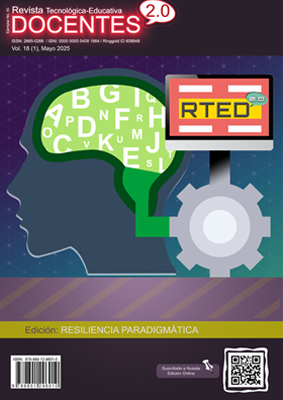Education in Socio-emotional and Citizen Competencies and a Culture of Peace through Art
 DOI:
https://doi.org/10.37843/rted.v18i1.548
DOI:
https://doi.org/10.37843/rted.v18i1.548
Main Article Content
Abstract
In the educational field, problems related to school coexistence, emotional imbalance of students, and poor academic performance represent complex challenges that require comprehensive solutions. This research explored how art, integrated into the educational context, can effectively strengthen emotional, social, and civic skills at the Yatí Educational Institution. Under the methodology of action research method, positivist paradigm, qualitative approach, with a descriptive participatory action research design. The sample included 156 key participants selected through convenience sampling: students, teachers, directors, and parents. Through participant observation, documentary review, and open interviews, preliminary results show that art promotes the development of socio-emotional skills, fosters values ??of peaceful coexistence, and strengthens ties within the educational community. It is concluded that integrating art into educational processes generates empathetic and socially committed citizens.
Downloads
Metrics
Article Details

This work is licensed under a Creative Commons Attribution-NonCommercial-NoDerivatives 4.0 International License.
Those authors who have publications in our journal accept the following terms:
- When a work is accepted for publication, the author retains rights of reproduction, distribution of his/her article for exploitation in all countries of the world in the format provided by our magazine and any other magnetic medium, optical, and digital.
- Authors will retain their copyright and guarantee the journal the right first to publish their work, which will be simultaneously subject to the Creative Commons Acknowledgment License (Attribution-NonCommercial-NoDerivatives 4.0 International (CC BY-NC-ND 4.0)). That allows third parties to copy and redistribute the material in any medium or format, under the following conditions: Acknowledgment - You must properly acknowledge authorship, provide a link to the license, and indicate if any changes have been made. You may do so in any reasonable way, but not in a way that suggests you have the licensor's endorsement or receive it for your use. NonCommercial - You may not use the material for a commercial purpose. NoDerivatives - If you remix, transform, or build from the material, you cannot broadcast the modified material. There are no additional restrictions - You cannot apply legal terms or technological measures that legally restrict you from doing what the license allows.
- Authors may adopt other non-exclusive license agreements to distribute the published version of the work (e.g., deposit it in an institutional archive or publish it in a monographic volume) provided that the initial publication in this journal is indicated.
- Authors are allowed and recommended to disseminate their work through the Internet (e.g., in institutional telematic archives, repositories, libraries, or their website), producing exciting exchanges and increasing the published work's citations.
- Request of withdrawal an article has to be done in writing by the author to the Editor, becoming effective after a written response from the Editor. For this purpose, the author or authors will send correspondence via e-mail: [email protected].
- The author will not receive financial compensation for the publication of his work.
- All Docentes 2.0 Journal publications are under the Open Journal System (OJS) platform at: https://ojs.docentes20.com/.
References
Abad, F. A. (2000). Bases epistemológicas y proceso de investigación psicoeducativa. CSV.
Aragay, X. (2017). Reimaginando la educación: 21 claves para transformar la escuela. Editorial Planeta.
Bahajin, S. (2018). La educación como instrumento de la cultura de paz. Innovación educativa. https://n9.cl/s3paw
Banz, C. (2008). Convivencia escolar. Valores. UC.
Beltrán Catalán, M. (2017). El papel de la competencia y el apoyo socioemocional en el bullying y en el cyberbullying. Universidad de Córdoba España. https://n9.cl/ed36t
Berger, C. (2019). Bullying. Gobierno de Chile, Ministerio de Educación. https://n9.cl/473cv
Burbano, A., & Páramo, P. (2021). El tercer maestro: La dimensión espacial del ambiente educativo y su influencia sobre el aprendizaje. UPN.
Cardona Isaza, A. (2021). Competencias socioemocionales, toma de decisiones y conducta antisocial-delictiva en adolescentes: Un estudio transcultura. https://n9.cl/h195v
Chaux, E., Lleras, J., & Velásquez, A. M. (2012). Competencias ciudadanas: de los estándares al aula: una propuesta de integración a las áreas académicas. Ediciones Uniandes-Universidad de los Andes.
Creswell, J. W. (2014). Research design: Qualitative, quantitative, and mixed methods approaches. SAGE Publications.
Claro, S. (2011). Clima escolar y desarrollo integral de niñas y niños: Historias, Aprendizajes y Proyecciones de una Experiencia. Santiago.
Del Rey, R., Ortega, R., & Feria, I. (2009). Convivencia escolar: fortaleza de la comunidad educativa y protección ante la conflictividad escolar. Revista interuniversitaria de formación del profesorado. Revista Interuniversitaria de Formación del Profesorado, 23 (3), 159-180. https://n9.cl/5qpm4
Díaz, M. J., & Aguado, J. (2004). La violencia entre iguales en la adolescencia y su prevención desde la escuela. Universidad Complutense.
Durlak, J. A., Weissberg, R. P., Dymnicki, A. B., Taylor, R. D., & Schellinger, K. B. (2011). The impact of enhancing students’ social and emotional learning: A meta-analysis of school-based universal interventions. Child Development, 82(1), 405-432. 10.1111/j.1467-8624.2010.01564.x DOI: https://doi.org/10.1111/j.1467-8624.2010.01564.x
Eisner, E. W. (2002). El arte y la creación de la mente: El papel de las artes visuales en la transformación de la conciencia. Paidós.
Fernández Berrocal, P., & Extremera Pacheco, N. (2003). La inteligencia emocional en el contexto educativo: hallazgos científicos de sus efectos en el aula. Revista de educación (RedINED), 332, 97-116. https://n9.cl/9lfos
Galtung, J. (1997). La educación para la paz sólo tiene sentido si desemboca en la acción. El correo de la Unesco.
Gambini, F. (2018). Relación entre la educación socio emocional y el desempeño académico de los estudiantes de educación secundaria. https://n9.cl/mc16o
Gardner, H. (2006). Las cinco mentes del futuro. Paidós.
Goleman, D. (1995). Inteligencia Emocional. Katz.
Hernández, R., & Mendoza, C. (2018). Metodología de la investigación. McGraw-Hill Education.
Hernández, R., Fernández, C., & Baptista, P. (2018). Metodología de la investigación. McGraw-Hill Education.
Kvale, S. (2007). Doing interviews. SAGE Publications. DOI: https://doi.org/10.4135/9781849208963
Stringer, E. T. (1999). Action Research. Thousand Oaks, CA: Sage Publications.
Tomaseivki, K. (1992). Informe a la Comisión de Derechos Humanos. (Unam Juridical Collaboration). Cátedra Unescodh.






